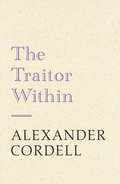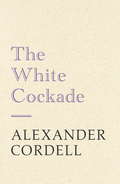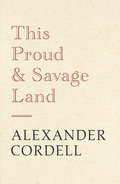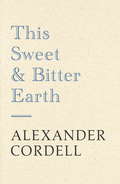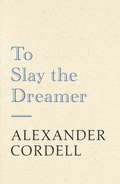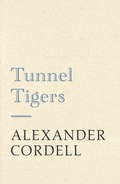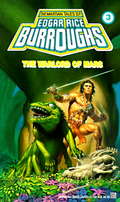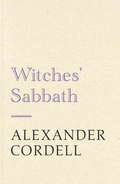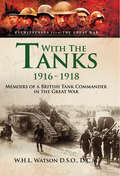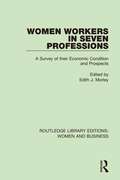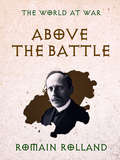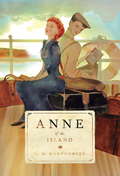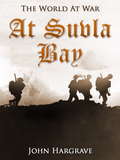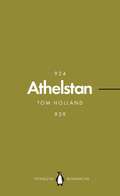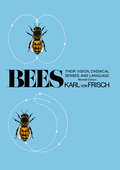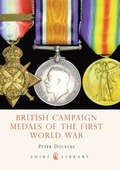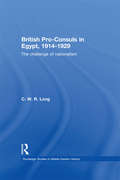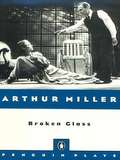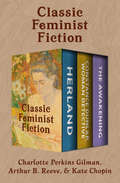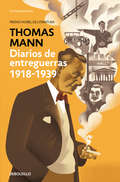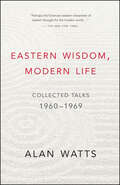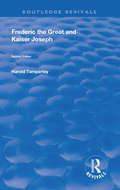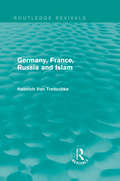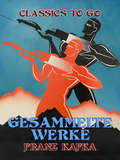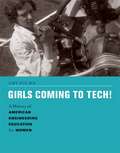- Table View
- List View
The Traitor Within
by Alexander CordellA fourteen-year-old Chinese boy struggles to prove his loyalty and courage to his commune and country in the face of his fear of a predicted attack on his village by the Taiwanese enemy.
The White Cockade: John Regan Trilogy Book One
by Alexander CordellAn enthralling story of high adventure, ambush and pursuit, plot and counterplot during the ill-fated United Irishmen Rebellion of 1798. When seventeen-year-old John Regan takes on a mission entrusted to him by his dying father, he rides through an Ireland seething with danger with more than just his own life in his hands. The first in a trilogy of books set in 18th century Ireland, from the bestselling author of Rape of the Fair Country.
This Proud and Savage Land
by Alexander CordellHywel Mortymer's story begins in 1800 when he is sixteen and a dramatic change in fortune leads him, innocent and inexperienced, to a brutal and dangerous life working in the coal mines. In the mines children can be horribly maimed in devastating gas explosions, or grow deformed with the burden of their labours and babies are born underground. Wales is in turmoil. A tragic divide between rich and poor, the workers powerless, penniless, starving and diseased sparks growing unrest as the newly founded Unions move inexorably towards the Chartist Rebellion. This Proud and Savage Land is a brilliantly detailed chronicle of early nineteenth- century Wales and a prelude to the bestselling Rape of the Fair Country.
This Sweet And Bitter Earth
by Alexander CordellThe men of the North Wales slate quarries lived dangerous, unhealthy and underpaid lives; as a boy Toby Davies joined them. The quarries taught him precious truths about poverty and exploitation, but Toby also learned of love from the two beautiful women in his life - Bron and Nanwen O'Hara. Toby moved south to seek work in the coal mines, but found no easier future. He was there at the notorious Tonypany riots of 1910 and the police occupation of the Rhondda, and would never forget the savagery of the battles fought between the workers and the bosses.
To Slay The Dreamer
by Alexander CordellFrom the Spanish sierras to the French Pyrenees, one desperate cause unites them. As the stromclouds gather in the passionate fight against the Fascists, a young Spanish countess and a trained american assassin join forces with the partisans in a desperate attempt on the life of General Franco. TO SLAY THE DREAMER is a rich and compelling story of a group of patriots ready to die for their country - a moving novel of dangerous loyalty amidst the ultimate futility of war.
Tunnel Tigers
by Alexander CordellBrunel, Stephenson, Locke and Vignoles - these were the magic names. And under them 10,000 laboured, blasting, shovelling and digging, changing the contours of Britain for a new age of railways. Among them is Nick Wortley, whose love for the daughter of the local mill owner is cruelly thwarted. Taking flight he is drawn by the irresistable clamour of the great Sheffield to Manchester, a railway which is preparing to drive a path of steel under the Pennines. Stephenson said it was impossible; Nick and his companions will prove him wrong, but at a terrible price...
Warlord of Mars
by Edgar Rice BurroughsFar to the north, in the frozen wastes of Polar Mars, lay the home of the Holy Therns, sacred and inviolate. Only John Carter dared to go there to find his lost Dejah Thoris. But between him and his goal lay the bones of all who had gone before.From the Paperback edition.
Witches' Sabbath: John Regan Trilogy Book Two
by Alexander CordellThe cauldron of revolution is boiling over and igniting the passions of the people of Ireland. The year is 1798 and seventeen year old John Regan faces danger and even death as he struggles alongside the leaders of the rebellion as they attempt to capture a valuable English hostage. The second in a trilogy of books set in 18th century Ireland, from the bestselling author of Rape of the Fair Country.
With the Tanks, 1916–1918: Memoirs of a British Tank Commander in the Great War (Eyewitnesses from The Great War)
by W.H.L. WatsonWilliam Watson was a young Oxford post-graduate at the outbreak of the First World War in 1914. Along with several friends from Oxford he enlisted in the army expecting the war to last six weeks. Watson began his service in the Great War as a British Army motorcycle despatch rider. He saw active service during the key battles of 1914 and early 1915. Watson was then commissioned and became a tank commander and saw active service with the tanks most notably at Cambrai in 1917. This well written and evocative memoir was originally published under the tile 'A Company Of Tanks' it constitutes a wonderful primary source and is an invaluable addition to the library of anyone with an interest in the evolution of the tank as a decisive weapon on the battlefield. Highly detailed, but nonetheless accessible this superb new illustrated edition, edited by Emmy AwardTM winning historian Bob Carruthers is greatly recommended for serious enthusiasts and casual readers alike.
Women Workers in Seven Professions: A Survey of their Economic Conditions and Prospects (Routledge Library Editions: Women and Business #14)
by Edith J. MorleyThis book, first published in 1914, examines the economic position of women at the turn of the twentieth century. Women’s economic position had been undermined by the helpless dependence engendered, among the better-off, by nineteenth century luxury, and among manual workers by the loss of their hold upon land and by the decline of home industries. The essays collected here examine the changing state of affairs, with a new force at work: the revolt of the modern woman against economic dependence in all forms.
Above the Battle (The World At War)
by Romain RollandAbove the Battle is an anti-world war I treatise by Romain Rolland written in 1916. (Excerpt) "A great nation assailed by war has not only its frontiers to protect: it must also protect its good sense. It must protect itself from the hallucinations, injustices, and follies which the plague lets loose. To each his part: to the armies the protection of the soil of their native land; to the thinkers the defence of its thought. If they subordinate that thought to the passions of their people they may well be useful instruments of passion; but they are in danger of betraying the spirit, which is not the least part of a people's patrimony. One day History will pass judgment on each of the nations at war; she will weigh their measure of errors, lies, and heinous follies. Let us try and make ours light before her!"
Anne of the Island
by L. M. MontgomeryEighteen-year-old Anne has left Green Gables for university in nearby Nova Scotia, where she will finally fulfill her dream of earning a degree. She sets up home in a cozy cottage in bustling Kingsport with Avonlea's Priscilla Grant and a new friend, the beautiful Philippa Gordon. But it's not all fun and games. Anne's childhood friend, Ruby Gillis, dies of tuberculosis back in Avonlea, shattering Anne's carefree attitude to life, and Gilbert finally declares his feelings and proposes. But Anne still has a naïve, overly romantic view of love and rejects him, driving a wedge between them. A two-year relationship with a fellow Redmond College student, Roy Gardner, follows, but when he also proposes, Anne realizes that he's not the one for her after all. When she returns to Avonlea and learns that Gilbert is deathly ill with typhoid, she is distraught. Will she recognize the depth of her feelings at last? Or is it already too late for Anne and her one true love?
At Suvla Bay: Being The Notes And Sketches Of Scenes, Characters And Adventures Of The Dardanelles Campaign - Primary Source Edition (The World At War)
by John HargraveJohn Gordon Hargrave (6 June 1894 - 21 November 1982), (woodcraft name 'White Fox'), was described in his obituary as an 'author, cartoonist, inventor, lexicographer, artist and psychic healer'. As Head Man of the Kibbo Kift, he was a prominent youth leader in Britain during the 1920s and 1930s. He was a Utopian thinker, a believer in both science and magic, and a figure-head for the Social Credit movement in British politics. "At Suvla Bay"; Being the notes and sketches of scenes, characters and adventures of the Dardanelles campaign. (Excerpt from Wikipedia)
Athelstan: The Making of England (Penguin Monarchs)
by Tom HollandThe formation of England occurred against the odds: an island divided into rival kingdoms, under savage assault from Viking hordes. But, after King Alfred ensured the survival of Wessex and his son Edward expanded it, his grandson Athelstan inherited the rule of both Mercia and Wessex, conquered Northumbria and was hailed as Rex totius Britanniae: 'King of the whole of Britain'.Tom Holland recounts this extraordinary story with relish and drama, transporting us back to a time of omens, raven harbingers and blood-red battlefields. As well as giving form to the figure of Athelstan - devout, shrewd, all too aware of the precarious nature of his power, especially in the north - he introduces the great figures of the age, including Alfred and his daughter Aethelflaed, 'Lady of the Mercians', who brought Athelstan up at the Mercian court. Making sense of the family rivalries and fractious conflicts of the Anglo-Saxon rulers, Holland shows us how a royal dynasty rescued their kingdom from near-oblivion and fashioned a nation that endures to this day.
Bees: Their Vision, Chemical Senses, and Language
by Karl Von Frisch Donald R GriffinOver half a century of brilliant scientific detective work, the Nobel Prize-winning biologist Karl von Frisch learned how the world, looks, smells, and tastes to a bee. More significantly, he discovered their dance language and their ability to use the sun as a compass. Intended to serve as an accessible introduction to one of the most fascinating areas of biology, Bees (first published in 1950 and revised in 1971), reported the startling results of his ingenious and revolutionary experiments with honeybees.In his revisions, von Frisch updated his discussion about the phylogenetic origin of the language of bees and also demonstrated that their color sense is greater than had been thought previously. He also took into consideration the electrophysiological experiments and electromicroscopic observations that have supplied more information on how the bee analyzes polarized light to orient itself and how the olfactory organs on the bee's antennae function.Now back in print after more than two decades, this classic and still-accurate account of the behavior patterns and sensory capacities of the honeybee remains a book "written with a simplicity, directness, and charm which all who know him will recognize as characteristic of its author. Any intelligent reader, without scientific training, can enjoy it."--Yale Review
British Campaign Medals of the First World War
by Peter DuckersBritain has issued medals rewarding war service since at least the early nineteenth century, and increasingly through the period of its imperial expansion prior to 1914, but examples of many of the early types are now scarce. However, few families escaped some involvement with "the Great War" of 1914-18, and many still treasure the medals awarded to their ancestors for wartime service. Today, with a growing interest in British military history and particularly in family history and genealogy, more and more people want to trace their ancestors' past. This book looks in detail at the origin, types and varieties of the British medals awarded for general war service between 1914 and '18, and gives advice on researching the awards and their recipients.From the Trade Paperback edition.
British Pro-Consuls in Egypt, 1914-1929: The Challenge of Nationalism (Routledge Studies in Middle Eastern History #Vol. 3)
by C. W. LongWith World War I and Egypt's colourful politics as background, C.W.R. Long tells the story of four proconsuls (McMahon, Wingate, Allenby and Lloyd), their principal opponent, Sa'ad Zaghul, and the great events of the time: the rise of the Wafd party, the uprising of 1919, the murder of Sir Lee Stack and the Allenby ultimatum. He sheds new light on the strife of members of the High Commission among themselves and the Foreign Office, on the struggle between Egypt and Britain for ownership of the Sudan, on Egypt's fight for independence and on the failure of democracy to take root in the country.
Broken Glass
by Arthur MillerTHE STORY: Brooklyn, New York. The end of November, 1938. Sylvia Gellberg has suddenly, mysteriously, become paralyzed from the waist down. As the play opens, her husband, Phillip, and her doctor, Dr. Hyman, meet to discuss the prognosis and test results. The doctor assures Phillip that physically, there is nothing wrong with his wife and that she is sane, but advises the only way to discover the cause of her paralysis is to probe into her psyche. At this point, the author begins to peel away all the layers of the characters' lives in this stunning, deeply effective exploration of what it means to be American and Jewish in 1938. In his attempts to uncover the truth about Sylvia's paralysis, Dr. Hyman, via conversations with Phillip, Sylvia, and her sister, Harriet, discovers that the Gellberg's marriage was built on resentment and that over the years has become loveless. While Sylvia's affliction leaves her terrified, it exposes Phillip's deepest emotions. He hates himself, and he loathes being Jewish. His self-hatred has always made him cold, and at times even cruel, yet, Sylvia's condition has magnified his feelings leaving him out of control with her, with Dr. Hyman and even with his employers. Dr. Hyman's obsessive determination to cure Sylvia leads him to discover that her paralysis occurred quickly after a newspaper report on Krystallnacht and an accompanying photograph of two old men forced to clean the streets of Germany with toothbrushes. She feels something must be done to stop the Nazis while most Americans believe the Germans won't allow them to get out of hand. But what can she do when she can't even change her own life? The atrocities in Germany, her husband's denial of his Jewishness and her own realization that she threw her life away have overcome her. Suddenly, she no longer simply feels helpless, she has truly become helpless. Finally, with everyone's feelings laid bare, the play comes to its heart-wrenching, electrifying conclusion, as Phillip has a heart attack and begs Sylvia's forgiveness as he dies.
Classic Feminist Fiction: Herland; Constance Dunlap, Woman Detective; and The Awakening
by Charlotte Perkins Gilman Kate Chopin Arthur B. ReeveNovels of romance, science fiction, and crime that explore gender roles and social expectations—and helped shape women&’s history. These three novels provide a fascinating look at some of the literary voices that influenced early views of feminism. Herland by Charlotte Perkins Gilman: Three sociology students journey into an uncharted region of South America and are shocked to discover a civilization of only women in this work of science fiction that paved the way for such authors as Margaret Atwood and Octavia E. Butler. Constance Dunlap, Woman Detective by Arthur B. Reeve: An early work of crime fiction featuring a female protagonist. The Awakening by Kate Chopin: A groundbreaking novel of early women&’s liberation set against the evocative backdrop of turn-of-the-century New Orleans.
Diarios de entreguerras 1918-1939
by Thomas MannLos diarios escritos por Thomas Mann en el periodo de entreguerras acerca de su cotidianidad, su proceso creador y el tiempo convulso que le tocó vivir. Los Diarios de Thomas Mann permiten entrever mundos hoy desaparecidos: el buen hacer de un artista metódico con rutinas y placeres plenamente burgueses; la agitada escena intelectual de principios del siglo XX en Europa, en la que Mann ocupaba un lugar central y en la que reconocía el protagonismo de sus contemporáneos Gide, Kafka, Joyce o Proust; o el laboratorio de un novelista incansable, que trabajaba por acumulación hasta producir obras sólidas como monumentos. Por todo ello, estos Diarios son un libro imprescindible para entender cómo fue este escritor moderno. Pero en lo personal se trasluce también lo político, y aquí aparece un duro testimonio del exilio al que Mann partió con su familia a los sesenta años, en 1933, poco después de la ascensión de Hitler al poder. Ante la caída de su patria en la barbarie, el gran escritor nacional no pudo ni quiso desconectar del sufrimiento de Alemania. No es de sorprender, pues, que en estas páginas dejara reflexiones sobre la historia que se han convertido a su vez en contundentes documentos históricos. La crítica ha dicho:«En sus diarios se entrecruzaba a veces Einstein con divos de Hollywood, con profesores de Princeton o de Harvard abriéndose paso en medio de los obstáculos que encontraba a la hora de escalar otras cimas literarias. Escribir siempre con grandeza al borde del acantilado, entre la belleza y el cieno, entre la estética y la putrefacción era la cumbre que más le atraía.»Manuel Vincent, El País «Los diarios acogen la cotidianeidad del escritor [...] Las páginas del diario de mayor interés sociopolítico son [...] páginas del exilio, inflamadas por la rabia, la tristeza y no exentas de cierta melancolía por la Alemania perdida.»Blas Matamoro
Eastern Wisdom, Modern Life: Collected Talks: 1960-1969
by Alan WattsAlan Watts introduced millions of Western readers to Zen and other Eastern philosophies. But he is also recognized as a brilliant commentator on Judeo-Christian traditions, as well as a celebrity philosopher who exemplified the ideas — and lifestyle — of the 1960s counterculture. In this compilation of controversial lectures that Watts delivered at American universities throughout the sixties, he challenges readers to reevaluate Western culture's most hallowed constructs. Watts treads the familiar ground of interpreting Eastern traditions, but he also covers new territory, exploring the counterculture's basis in the ancient tribal and shamanic cultures of Asia, Siberia, and the Americas. In the process, he addresses some of the era's most important questions: What is the nature of reality? How does an individual's relationship to society affect this reality? Filled with Watts's playful, provocative style, the talks show the remarkable scope of a philosopher at his prime, exploring and defining the sixties counterculture as only Alan Watts could.
Frederic the Great and Kaiser Joseph (Routledge Revivals)
by Harold TemperleyFirst published in 1915, this volume is Temperley’s ‘raciest piece of non-stop narrating and his most colourful finished work -the whole mixture to be taken in one breath’. And in describing the events of the ‘potato war’, the problem of Bavaria, the peace of Teschen and the dynastic tangle of the Diplomatic Revolution Temperley reveals the great interest he felt for the characters of Frederick II and the Emperor Joseph II. This remains a stimulating account of mid-eighteenth century European politics.
Germany, France, Russia and Islam (Routledge Revivals)
by Heinrich Von TreitschkeHeinrich Von Treitschke was a prolific German historian and political writer during the nineteenth century. In Germany, France, Russia and Islam, first published in 1915, he considers European diplomatic relations from the patriotic perspective of imperial Germany, in particular examining Germany’s relationship to Turkey and France. This is a fascinating classic work, which will be of great value to academics and students interested in nineteenth-century European politics and history.
Gesammelte Werke (Classics To Go)
by Franz KafkaDas Werk von Franz Kafka ist ein Klassiker der modernen Literatur schlechthin. In sein faszinierendes Erzähluniversum führen keine Abkürzungen und Hintertürchen: Man muss es ganz für sich persönlich entdecken und lesend erkunden. Ein Glück für jeden, der diese große Erfahrung vor sich hat. Dieser Band bietet dazu die beste Gelegenheit. Er umfasst Kafkas Romane 'Der Prozess' und 'Das Schloss', den 'Brief an den Vater' sowie sämtliche Erzählungen, unter ihnen 'In der Strafkolonie' und 'Die Verwandlung'.
Girls Coming to Tech!
by Amy Sue BixEngineering education in the United States was long regarded as masculine territory. For decades, women who studied or worked in engineering were popularly perceived as oddities, outcasts, unfeminine (or inappropriately feminine in a male world). In Girls Coming to Tech!, Amy Bix tells the story of how women gained entrance to the traditionally male field of engineering in American higher education. As Bix explains, a few women breached the gender-reinforced boundaries of engineering education before World War II. During World War II, government, employers, and colleges actively recruited women to train as engineering aides, channeling them directly into defense work. These wartime training programs set the stage for more engineering schools to open their doors to women. Bix offers three detailed case studies of postwar engineering coeducation. Georgia Tech admitted women in 1952 to avoid a court case, over objections by traditionalists. In 1968, Caltech male students argued that nerds needed a civilizing female presence. At MIT, which had admitted women since the 1870s but treated them as a minor afterthought, feminist-era activists pushed the school to welcome more women and take their talent seriously.In the 1950s, women made up less than one percent of students in American engineering programs; in 2010 and 2011, women earned 18.4% of bachelor's degrees, 22.6% of master's degrees, and 21.8% of doctorates in engineering. Bix's account shows why these gains were hard won.
